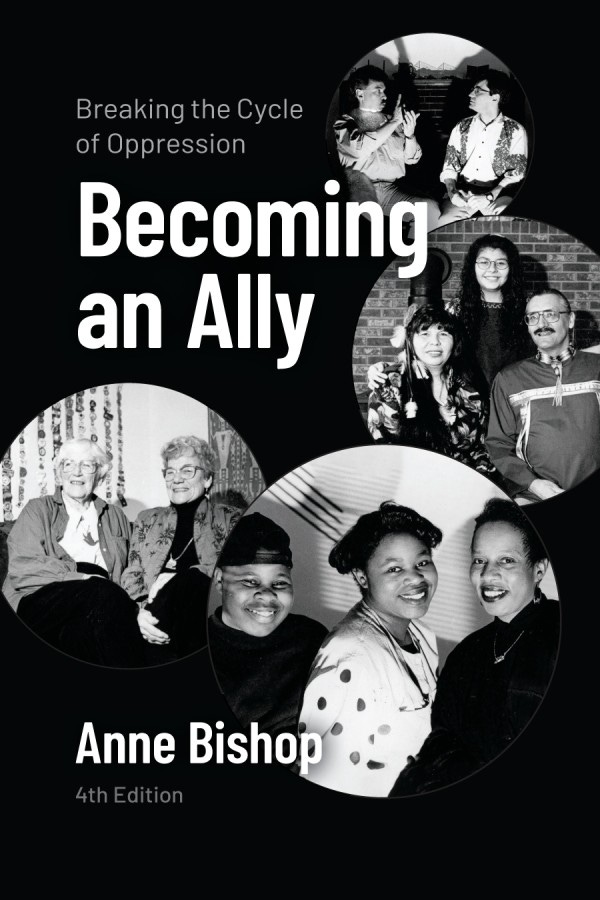Becoming an Ally (4th edition) by Anne Bishop
Breaking the Cycle of Oppression
In Becoming an Ally: Breaking the Cycle of Oppression (4th Edition), Anne Bishop revisits a theme that has been important to her for decades. Bishop wrote the first edition of Becoming an Ally in 1994, after teaching about structural oppression for almost ten years. While progress has been made since that first edition, the themes covered are “still relevant, unfortunately,” as Bishop observes in the book’s Preface.
“The struggle for equality is far from over, Bishop notes, and to avoid divide and conquer strategies, it’s important to be able to work together.”
The struggle for equality is far from over, Bishop notes, and to avoid divide and conquer strategies, it’s important to be able to work together. To that end, the updated version of Becoming an Ally offers “a new summary of how we can all contribute to justice by fighting our own oppression and, when a form of oppression gives us privilege, acting in solidarity as allies.”
Becoming an Ally is divided into four sections, “Allies and Why They Matter,” “Oppression,” “Change and Transformation,” and “Becoming an Ally.” Along the way, Bishop delves into history, anthropology, sociology, and other disciplines as while exploring issues like the roots of oppression, the history of slavery, the Enclosure Movement, healing and social justice, and collective trauma and how it shapes us.
Topics like scapegoating, tokenism, and institutional dynamics are discussed. Bishop examines why institutions are resistant to change, and offers strategies for bringing about change in spite of that resistance. The wealth of the few and the “myth of scarcity” are also explored.
When it comes to allies, the book discusses what allies do, what they don’t do, and why some groups or individuals might prefer to do their work without allies. The importance of considering “own voices” first is stressed.
Some learning activities are explained, including one called the Power Flower, which encourages participants to “explore the complexity of their identities as individuals who are both privileged and oppressed.” Bishop also offers a schematic for understanding the relationship between class and other forms of oppression.
Becoming an Ally touches on the quantum universe, chaos theory, and what the science of complex systems can tell us about how institutional behaviour.
Bishop notes that for the vast majority of the humanity’s existence, societies were built on cooperative models, not competitive ones. Respect for nature and the desire to work together for the common good, Bishop argues, are not foreign concepts for humanity, but rather long-respected approaches that were usurped by conquering warrior societies, or by colonialism. Cooperative, nature-respecting models of living aren’t a new concept, but rather ones that served humanity well through millennia.
Near the end of Becoming an Ally, Bishop states, “I long to live in a culture and society based on caring, cooperation with each other and the natural world, equity, common wealth and the sacredness of all beings.” Those who share some or all of these ambitions should find Becoming an Ally of interest. In particular, the publisher’s site recommends it for “social workers, teachers, medical professionals, policymakers and anyone who wants to understand the origins of oppressive societies in order to build more just alternatives.”
About the Author
Anne Bishop has been working toward social justice through adult education and community organizing for more than 50 years. Her activism aligned with making an income for three years as coordinator of development education for Canadian University Services Overseas and for a decade developing community leadership education through a university continuing education department. The rest of the time, she earned her living through freelance writing, editing, teaching, facilitation, research, union organizing, farm labour, restaurant hostessing, managing a used clothing store, supporting worker cooperatives, working on the line in a fish plant and an industrial sewing shop and, for twenty-five years, raising sheep, chickens, fruit, berries and veggies. Anne has co-authored four books on popular education and one on the Canadian food system and is the author of two books about allies. In 2019, she published her first novel, Under the Bridge.
About the Reviewer
Ontario resident Lisa Timpf writes poetry, book reviews, short stories, and creative nonfiction. Her speculative poetry collections Cats and Dogs in Space (2025) and In Days to Come (2022) are available from Hiraeth Publishing in print and electronic formats. Lisa is a member of SF Canada and the Science Fiction and Fantasy Poetry Association. You can find out more about her writing projects at http://lisatimpf.blogspot.com/. Lisa is also on Bluesky, @lisatimpf.bsky.social
Book Details
Publisher: Fernwood Publishing
Publication date: Oct. 21, 2025
Edition: 4th
Language: English
Print length: 224 pages
ISBN-10: 1773637436
ISBN-13: 978-1773637433




